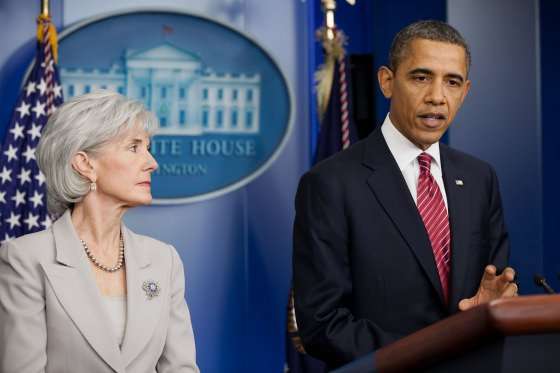Obamacare's Exchanges Aren't Like the Massachusetts Exchange. Is That Why They're in Trouble?

When critics have pointed out that setting up Obamacare's exchanges, which are supposed to offer real-time verification of an individual's eligibility for insurance subsidies, represents a major technical challenge, supporters of the health law have occasionally responded with some variant of: Well, it can't be that hard. After all, Massachusetts did essentially the same thing.
Except that it didn't. The Massachusetts system does resemble Obamacare in many important ways. It has an insurance exchange, called the Connector, that allows individuals to compare coverage options. But it has not offered real-time verification of eligibility for its state-subsidized insurance options.
In fact, the eligibility process takes a relatively long time.
The Bay State health care overhaul signed into law by Governor Mitt Romney in Massachusetts created a publicly subsidized insurance program for lower income individuals called Commonwealth Care. Individuals and families are only eligible for that program after filling out a 15-page Medical Benefit Request form.
That form then has to be submitted, along with proof of income, citizenship, immigration status, for processing. The form is the same form used to apply for Medicaid in the state, and processing is handled by MassHealth, the state's Medicaid program.
Once the form and additional materials are submitted, the applicant must wait for a response in the mail, which can take days or weeks. Only at that point does an applicant find out if he or she is eligible for subsidized coverage, and what the subsidized plan particulars are.
You can see a basic explanation of the process on a Commonwealth Care brochure published by the Connector, which administers the Commonwealth Care program.
Now, those not applying for Commonwealth Care can go online and quickly compare prices and benefits of other health plans offered through the Connector. These plans must be approved by the Connector Authority, which exerts some influence over plan pricing and benefit design and has sometimes rejected plans it deemed as too expensive.
But so far, the system has not made instantaneous judgments about eligibility for the subsidized coverage options available in Commonwealth Care.
I say so far because that's set to change next week. The old Commonwealth Care program will end this year, and when Obamacare's exchanges go live on October 1, subsidy judgments and relevant pricing comparisons for exchange-purchased coverage in Massachusetts are supposed to be done in real time.
Massachusetts, along with 15 other states, will be continuing to run its own exchange. One of those, Oregon, has already said it will delay its exchange's online enrollment functionality.
The other 34 exchanges will be run by the federal government. And that's where the potential technical problems loom largest.
According to a Wall Street Journal report from last Friday, the technology that is supposed to power those 36 exchanges is having trouble correctly pricing subsidized insurance coverage. Testing on the online calculator that's supposed to determine those prices was supposed to begin months ago, but reportedly only began last week. In response, a health consultant and former federal health official who used to oversee the exchanges told The Washington Post, "Nobody is going to say we're not starting on October 1, but in some situations, you may see a redefinition of what 'start' means."
Looking at how Massachusetts initially built its system suggests why the federal government appears to be having such trouble with its technology. It wasn't just a matter of scaling up an existing system. In addition to coordinating multiple federal and state databases that weren't involved in the Bay State's plan, the federally run exchanges are also aiming to offer real-time responses that the original Massachusetts exchange took days, at least, to come up with. It's not just a big challenge, in other words. It's a new challenge. We'll know soon enough whether the folks implementing Obamacare have figure out how to make it all work.
Update: California, at least, says its state-run exchange is ready to go. "We know of no glitches that are California glitches with regard to pricing," California exchange director Peter Lee tells The Huffington Post.
A report in The Hill, meanwhile, suggests that the federal officials expect that some of the exchanges may be somewhat glitchy on opening:
We're one week from the opening," [Centers for Medicare and Medicaid Services Administrator Marilyn] Tavenner said. "I am so ready to quit talking about 'Are we ready?' and switch to 'Here are the things we need to resolve, here are the mitigation strategies, here is what we're doing to correct and identify a problem.' "
Tavenner and her team are responsible for launching 34 health insurance marketplaces for states that refused to create their own under ObamaCare.
Her acknowledgment Tuesday points to the likelihood that not every exchange will operate smoothly from day one.


Show Comments (104)